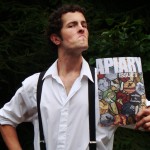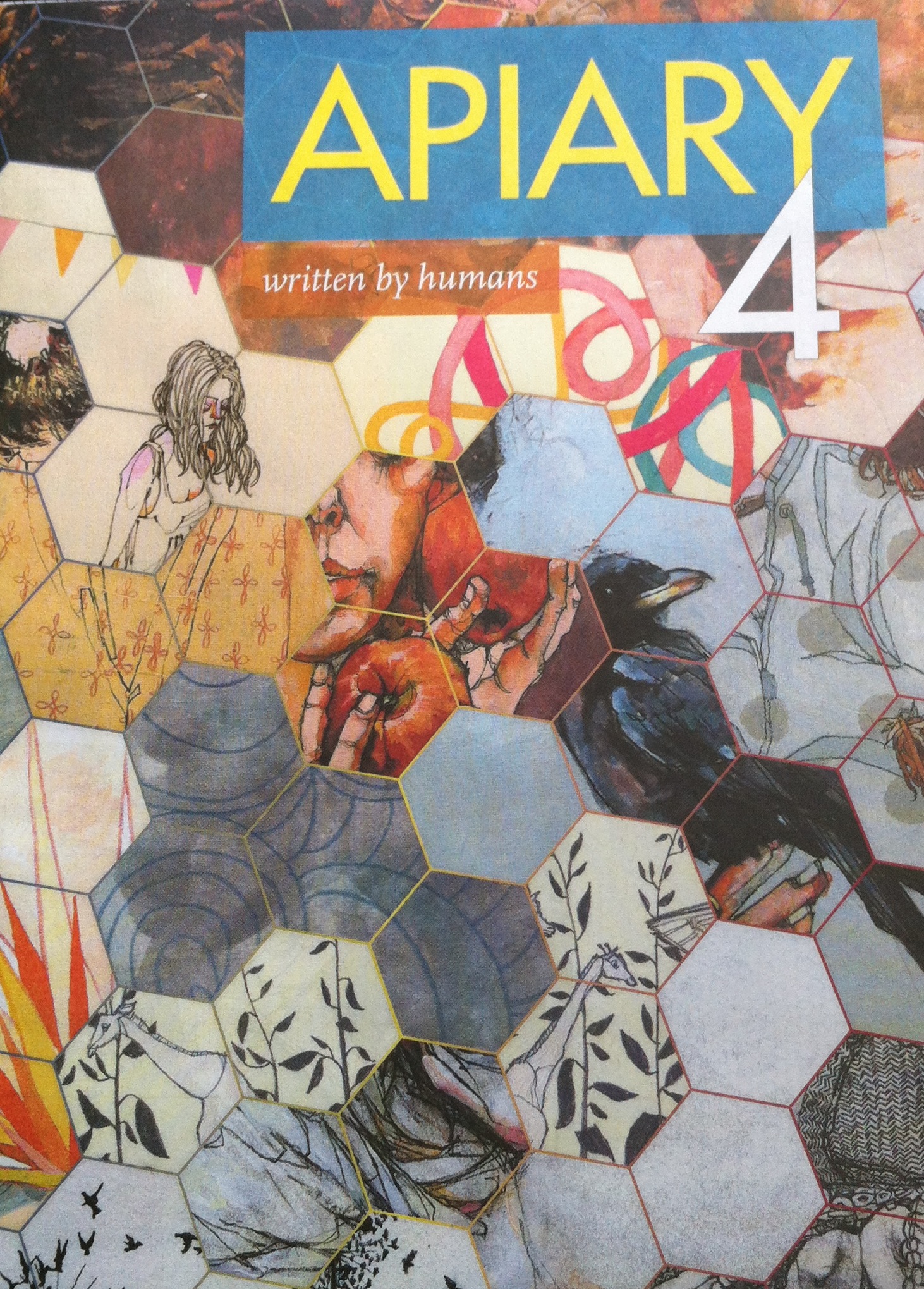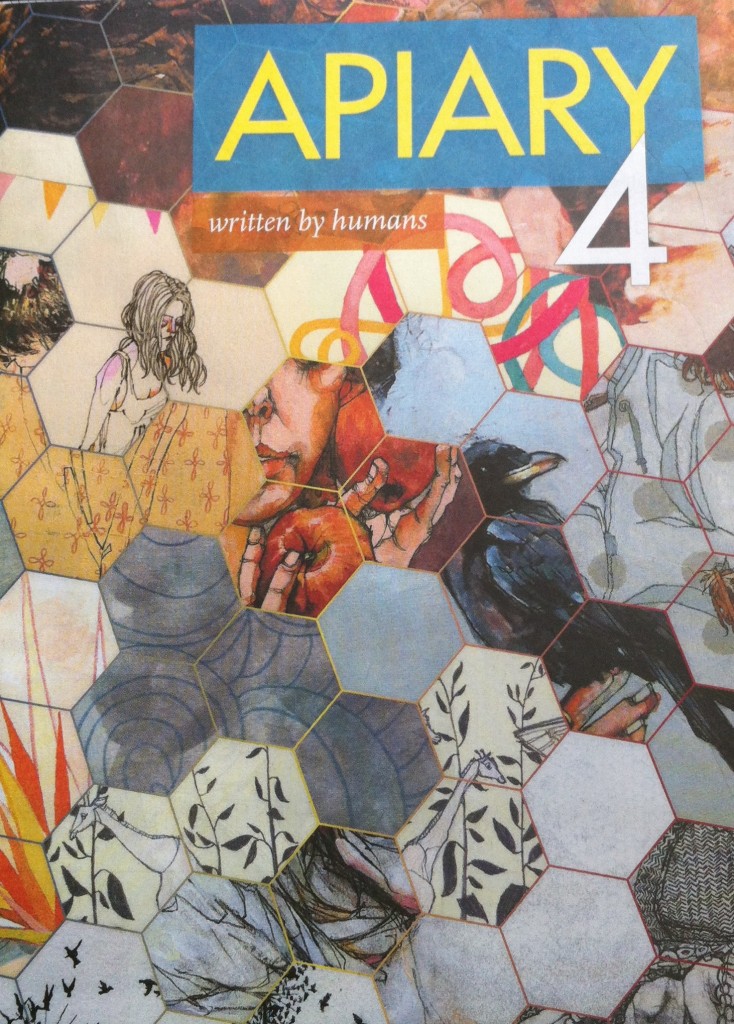Reviewed by Steve Burns. Read the review here. Subscribe to Apiary here.
 Ernest Hilbert’s newest collection of poems, All of You on the Good Earth
Ernest Hilbert’s newest collection of poems, All of You on the Good Earth
, gets its name from an outer-space transmission sent during the Apollo 8 mission. Captivated by the Earth’s movement over the moon’s horizon, Frank Borman said, “Good night, good luck, a Merry Christmas, and God bless all of you—all of you on the good Earth.” Hilbert prefaces his book with this grand vantage point, and it works. From brown waters cramped with bits of boats and ghosts, to apartments clouded with drug dust, and skies filled with lumbering zeppelins, Hilbert’s poetic stance is a satellite in action; his poems orbit the globe capturing (in high-res) the grime, sublime, and everything in-between. Because of Hilbert’s broad perspective, however, a few poems occasionally get lost among the stars. It’s not that Hilbert is trying to cover too much terrain; some lines rooted around my mind for days (“Crust of diamonds on the throat of a corpse”) while others, grounded in the daily human humdrum, fell flat in the shadows cast by poems of immense grit and grandeur.
Hilbert’s poetic prowess shines brightest when his lines are coated in darkness. “Sailing the Mullica River (Great Bay Estuary) 1978” sends the reader downriver atop waters “housing ghosts and unseen summers in shadow.” With his father, an old sailor himself, the speaker witnesses “clouds dyed and bruised like the sea.” Black mud stirs below their traveling vessel. Images like these, while beautiful, are dabbed with gloom. Hilbert excels with a somber palette—especially when he’s painting lines of the seafaring sort. “Ashore,” depicts a “harpooned great white shark” who’s washed up on the beach—dead. A crowd gathers to inspect the body. Hilbert is quick to remind the reader that, beneath the waves, lies “slit sails, drowned crews, [and] split hulls.” Setting aside visions of oceanic romance, Hilbert exposes the sea’s subtle haunting humanity. It’s a visceral must-read sonnet.
But let’s not get too serious. Ernest Hilbert can have fun. Of all Hilbert’s poems in All of You on the Good Earth, there’s nothing like “Sunrise with Sea Monsters.” As a love letter to Ray Harryhausen (American producer and visual effects pioneer who created films like It Came from Beneath the Sea), the poem is a huge success, but it’s also something more. “The Beast from 20,000 Fathoms skulks/Ashore, hearing a foghorn, lonely for friends” writes Hilbert who also mentions the “clumsy frogman from the Black Lagoon” and “Nessie.” These are set pieces that, despite their hilarity, make us feel for these ugly mugs. They’re “[b]eaten back by ray guns, germs, and Marines” as sea gulls peer into the ocean “watching for the next poor monster.” We almost revel in their destruction. This rare moment shows that Hilbert can be humorous, albeit the dark sort.
In a few instances, All of You on the Good Earth leaves the gritty and the strange behind in favor of ‘grounded’ moments of travel, isolation, and grumpy mornings. Hilbert’s “Dusk in a Crowded Train Compartment, Regretting My Life” illustrates an unfortunate train ride home; the speaker’s “too tired/To read, cramped by a pimpled giantess.” Hilbert’s “Man’s Home, His Castle” describes a “lonely noon” that ends when the speaker decides to go to bed early. Lastly, in “Bitter Beginning,” the speaker “burrow[s] in [his] comforter” because he doesn’t want to complete the day’s chores. After witnessing monsters emerge from the briny deep, it’s disappointing to return to the ordinary. Luckily, Hilbert supplies us with poems like “Nights of 1998” to keep things fresh. There’s an intense party happening downtown (drugs, drinks, fights, and puke included) in the speaker’s apartment and he’s attempting to make sense of the unfolding mayhem. “I’m lit like a war,” he says. What a fantastic line. “We fall apart like ancient stars, sparks—/Gold like pollen blown across all this dark” writes Hilbert. Suddenly, I’m back in space, watching the Earth, Ernest Hilbert’s Earth, rotate wonderfully, horrifically on.




No Comments